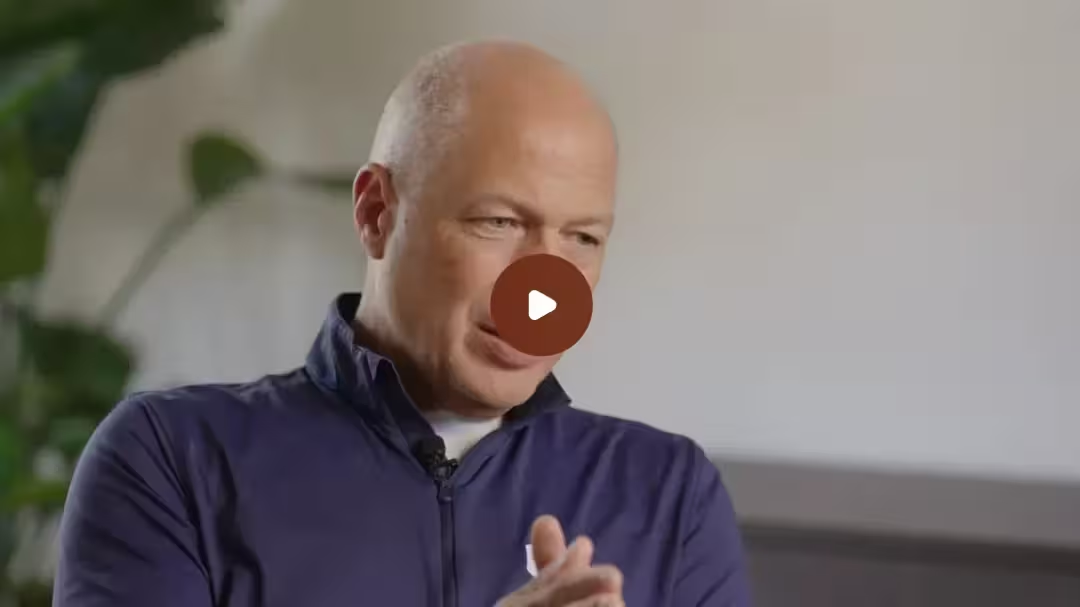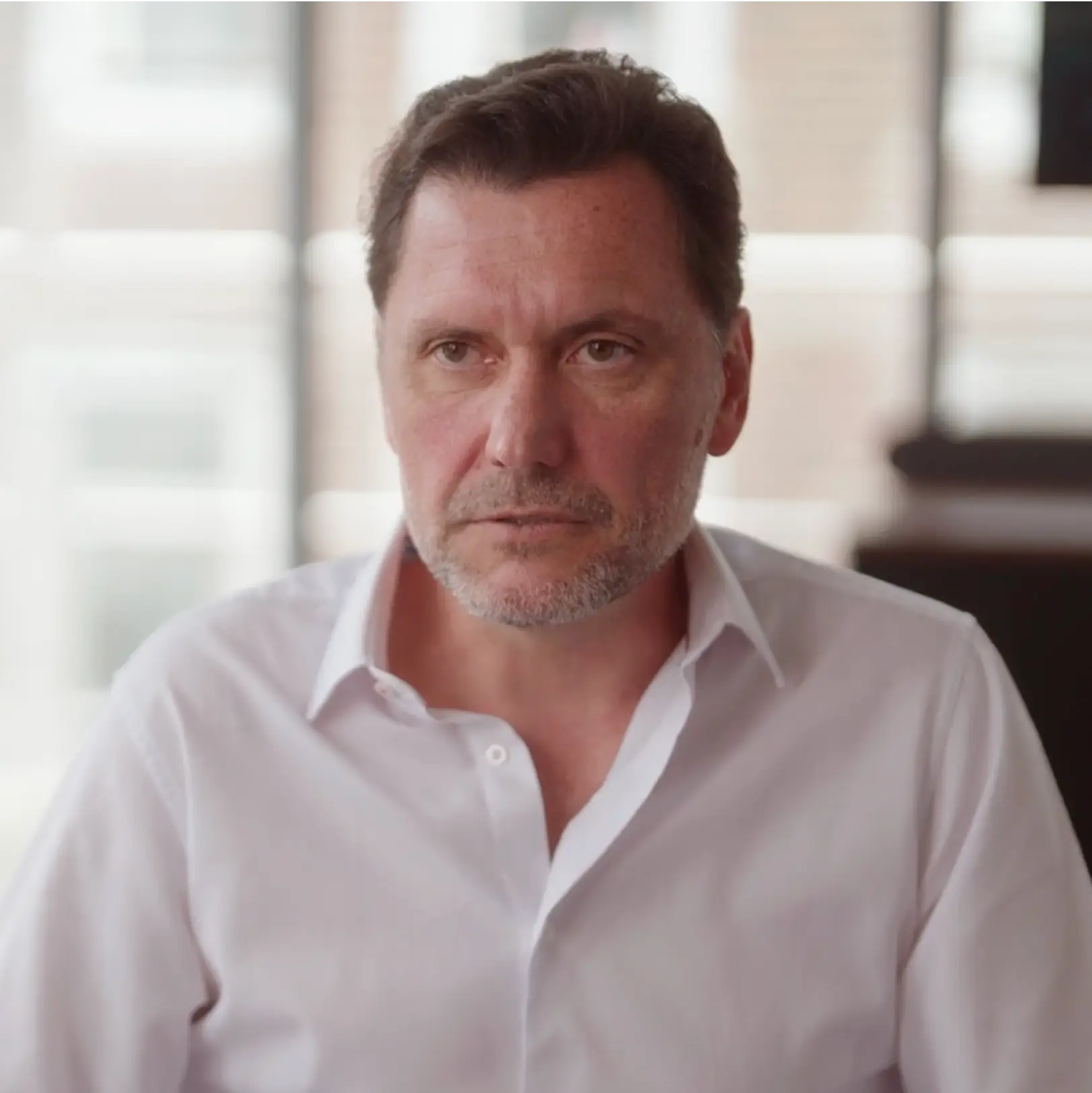The Interview
Kluster's Take
Theo spoke with Ross Morgan, Principal Sales Trainer at Conscious Selling, Inc. He describes what makes a high achiever.
Ross had a successful sales career, building pipeline and teams. He’s now passing that onto others in his work as a sales trainer. He has always enjoyed ramping reps and turning them into high performers.
He believes that an A player doesn’t only want to be number 1 in their team. They want to be number 1 everywhere. Ross stresses that he doesn’t come across A players often enough, believing that it’s a rare mentality. A player’s operate out of a state of power, not fear. Problems can be avoided if salespeople align with the philosophy of the company.
Transcription
The one thing that gets in the way of medium to great sellers is the application piece. It's the only thing that translates knowledge and skill. Okay.
Ross welcomes the cluster community blog. I'm super excited this discussion on upscaling reps, but first of all, it like starts off with a bit about you. So, Ross, what is your story in sales up until this point? Well, it's been a pretty good run. I've been software high tech sales for just under 10 years now is when I got into it sort of late twenties.
And, uh, you know, attention primarily on the revenue side of the business building pipeline, building sales teams. And then I got into sales training four years ago. So that's a little bit about my background and the company I am with is conscious selling. So we're in the business of helping high-tech organizations at various stages, mainly high growth.
Uh, do what we're going to be talking a lot about today, which is, you know, how to figure out how to become more top performers and grow revenue. So I'm Canadian, I'm north of the border. I'm a father of three and that's my spiel. Fantastic. That's a great, great download that. So why the move into coaching four years ago?
Well, I look forward the most, every time. As much as I love to manage the business, it was, uh, couldn't wait for the new cohort to arrive and we'd spent quite a bit of time hiring them in, but when you get them into the organization and you bring them up to speed and you get them sort of, uh, aligned with your P philosophies and guiding principles and teach them how to be successful.
That was really where I did the most amount of good work. So I think that triggered a lot of, uh, you know, wanting to move to the sales team. Fantastic. That's a great segue then into our, into our first question. So Ross, in your mind, what the fines in a player, there's two ways of looking at this. There's the metrics and then the actual personality traits.
If we begin with the personality traits, how would you define an, a player.
Biggest thing, because it's the question. What makes a player stand out first and foremost? It's the killer instinct it's wanting to win. And if salespeople are listening to this, you got to ask yourself if you have crossed the chasm yet, you know, some people are new to sales. And they haven't got too far into their role yet.
Some of them may be in denial. Maybe they want to do something else, but not until you make the decision to be world-class. Are you going to have any chance to become world-class? So I think that's the first thing is killer instinct. Doesn't always exist in every one. And when I'm talking about killer instinct, I'm talking about someone who walks into an organization.
Doesn't just want to be number one on a team. Doesn't just want to be number one in their territory. The second that they sell into, they want to be number one everywhere, overall, all over the place. So I'd say that's the biggest thing that needs to be in place. And. If not tough, right? You like that? The killer instincts.
I liked that a lot. So in your time in sales, how often do you come across a rep who has that killer instinct that we're talking about here? Not often enough, not often enough. Uh, it's evident when you come across them because they're obsessed. All they want to do is get better. They take in the right information.
They hang around the right people and they're willing to practice. You know, the one thing that gets in the way of medium to great sellers is the application piece. It's the only thing that translates knowledge and skill. So how do you find people? How do you align them with your philosophy? And I think that's also where it starts to like salespeople have this guiding philosophy that needs to align with the.
And, uh, you know, some companies could be to fill a market B other companies solve a social problem. Other companies make as much money as humanly possible, and those are all fantastic philosophies, but the sales person walks into the organization. If the philosophy doesn't align. It can cause problems and 99% of the time companies may fool you.
They may say we're here to solve a problem, solve a personal problem, solve a social problem, but then you find out all they care about is building pipeline. And figuring out the fastest way humanly possible to get to the IPO. And there's nothing wrong with that. It's actually an organization that I would love to be a part of, but that's another piece of advice for someone who isn't necessarily getting where they want to go.
You got to ask yourself, is there alignment there? Awesome. That, that that's, that's a great piece there on the, on the, uh, a rep I'm interested in your opinion on how much of this is a mentality. And how much of it is in is, is a talent thing. So like a mentality in terms of like, would they have been able to just, if they went into any, any stores of space, would they still be able to replicate the same similar sorts of results?
Or is this, do you think there are times that salespeople are, they have the characteristics that, that allow them to be a success? Some people have the intangibles. There's definitely things that can, and can't be. And that's what you've got to think of when you're bringing new people into your organization.
People with killer instincts that want to dominate everything that they do, and when they're going to do well in anything, it doesn't matter what you put them in a CSM role they're going to do well, put them in a growth role. BDR doesn't matter. They're gonna win because there's only one choice and that's to win.
But, uh, sorry, I don't know if that was answering your question or not. No. Yeah, that, that that's 100%. That's kind of where I thought it would be mentality in sales. I mean, it's, it's hard. It's hard to combine it. The reps have it, have a truly, truly great mentality question on for you now, as someone who coaches, these, how easier a players to coach and to lead.
Most of the time, it's like a hot knife through butter because they've made the decision to be excellent. They view you as a vehicle to get there and they have this mentality of you telling me what to do and I'll do it. Yeah. Hold themselves accountable. They're willing to fall over. And, uh, you know, that's the other thing that kind of gets in the way is I believe that when you assign someone, a sales quota sometimes common sense goes over.
So, for example, I hire you into an organization you interview extremely well. Everyone falls deeply in love with you. They love you. It's Theo. The guy's the man. However you get on a sales call, your first sales call, can you morph into some on recognizable human being that no one's ever heard of? You start doing things that you typically wouldn't do unless you were in a sales situation.
And that's because you're operating from this place of. Fear of not hitting quota, fear of what your manager thinks of you. Fear of not being qualified, to speak to these prospective clients, to pull the pain, the quantify, the business, financial impact, whatever the case is, you freak out. And again, you've got to ask yourself if you're not a high performer, are you operating from this place of fear or are you operating from this place of power?
I'm going to place a power. I deserve to be in front of these prospective clients. I get them what they want and what that is, is more. That's so interesting. So, so go into that for me a bit more. So you're seeing that a players understand they operate in a place, not a fear, but of power. How do you, how do you get that shift?
Because I'm assuming not every person starts with that. You know, it's quite an, a nervous situations. It may be cold call some of the FaceTime. How would you make that shift? Is it a learned behavior? Yes. Yes. And for some, it takes longer than others. What you're trying to get into. Is what's called a prosperity mindset.
So if you carry a quota, whether you're on a monthly or quarterly, your attitude is I'm going to be okay. So if I'm interacting with you for the first time, I got big opportunity with you. I'm okay. If I get the deal or not, I don't sound desperate. I don't sound like I need the business. I know I've got enough skill.
If it doesn't go well with you Theo, I got a million different people to call my pipelines. Big, no big deal. We're still friends. So the other way to get someone in a prosperity mindset is to put a whole bunch of money in their bank account that away on vacation. And the only reason they come back is because they're so passionate, but working for you and you know, everything aligns.
But yeah, that's what it is. It's just. And also understanding, you know, so many salespeople think that they're just going to show up. Today's the day. You will never rise to the occasion ever. You only fall as to your highest level of preparation. That's it? So while all these sellers think that they're going to have a good month, it doesn't happen.
I love that. And I've heard something quite similar before from a, for north called James clear. He, he goes on about that atomic habits, um, which is a great book. So you mentioned something there about, you know, be understanding that, okay, if I lose this deal, I lose this deal, but I'm prepared for it. So how do you strike the perfect balance between, so I think it is important to be very much.
I understand I can lose this and I can win this. Um, I'm okay with both actually, because I, I, I believe that I can get something else somewhere else, but how do you counteract that with someone who's super driven and who doesn't want to lose? Because in sales, loss is inevitable, right? Like sports. So how do you, how do you get that perfect balance for, for a rep and the reps that you've seen?
How do they, how did they strike that? It's how they bounce back. I mean, I'm in the same boat. Nothing will piss me off more than losing the deal that I thought I should win. I'll go three, four days. Maybe I won't show it, but I'm angry for a lot of different reasons because maybe I think I've wasted my time, but then I take a step back and I asked myself what really happened.
What has gone on. And this is what I will lean on my mentor. Right. So grew Ganesha is my he's my business partner and he's my coach. He's my best friend. He's my mentor, everything. So I'll call him and he'll go, I get it. Give me 15 minutes and we'll dig into the deal and we'll figure out that it wasn't meant to be.
No, the intent needs to be, let's not do business together. And until both parties are completely convinced us the right thing to do. And the other side is going to get a ridiculous return on the investment. But when you actually take the time to not just hammer down the phone, get mad and move onto the next one.
When you actually think about it and you break it down, you start to figure out you never, ever had it in the first place for all these reasons. And when you do that exercise, All of a sudden it becomes. Okay. Awesome. So, so let's set a scenario then let's say X rappers is a deal. What would you recommend that they do when they lose that deal?
The same day? The first thing I would do is you got to make the prospective client that you're selling to your mentor. They've already given you 5, 10, 15 hours of their time. Yeah. Everyone's collaborated together and invested a boatload of money effort. Call them up, ask them for some guidance, not begging for the deal.
There's no deal to have, but where did we go wrong? What could I have done different? If I move into the future, what are one, two things I could have done to maybe avoid the problem that we ran into instead of month five in month one? And that's the first thing I would do, right? I mean, most people scramble.
They try to win something. I don't think that's the right move. You got to diagnose why it didn't happen. And if you've got an executive sponsor, Who trusts you, who wants you to do well because you've built a phenomenal relationship. They're going to tell you. Yeah, that's, that's great. And I think it's probably something that not many reps do, but I think it's something that is great in our community by hearing from, and I've I've throughout this conversation, I've noticed this, that, you know, you've gone about certain failures and learning from failures.
How important is, is, is failure in sales because it's inevitable. Yeah. It's it's, you know, there's a lot of people that say it, it sounds cliche, but it is, it's the way to learn. It's the way to grow. It's the way the man up. It's the way to be better. You need it. I thrive when sometimes I lose, because if I can say I don't need it, I know I'm in a much more powerful position.
And, uh, you know, you know, you've won in sales when you're willing to walk over. And, you know, nothing feels better than walking away from an opportunity. You know, you sit in there, you're going, Nope, this isn't for me. This is not a win-win, this doesn't feel right. You walk away, that's posture, that's integrity.
And again, that is the killer instinct. I only want to work with the right clients. Now, if you're in a highly transactional environment, a little bit different, but, uh, You know, the other thing I'll say about high performers is, you know, if you're a sales manager, you got to stop hanging on to be players.
It's the worst thing organizations can do. They spend all their time trying to get the beat player up to a level. You see it, 99% of articles move the middle. Of course you got to move the middle, but if the middle isn't ready to go and they don't have a killer instinct, you got to move them up. And all organizations, the ones that I work with, the ones that are all out there that you interact with all the time, every single one of them is trying to grow revenue by growing head count.
And my advice always is if you've got a team of 10, don't bring anybody on until every single member on that team is meeting or exceeding the quota. Every single one. Because if you do that, the chances of the new hire coming in, hitting it out of the park, what do you think's going to happen? And it shows up all over the place.
You know, two weeks ago I took my kids trick or treating my kids, never went to Patreon on their own. I would have to walk up to the house with my kids, with my wife now, new game. So my wife and I stood on the street, drinking tallboys, just like every other parent. And I was watching my kids first off, they were on their own and they didn't really know what to do.
They were walking up and down people's driveways. They weren't running, they were watching what they were doing. All of a sudden, we met up with a couple who had two older children, two girls, my wife knew them, goes to church with them. They knew how to hustle. They knew how to go collect candy all of a sudden, because they were hanging around rockstar.
And the goal is now let's fill this bag no longer. Were they running up and down driveways? They were cutting lawns. They were jumping over hardens. They were rolling up their sleeves. They were winning. So it, you see it everywhere. And most kids, some kids may fall back. They want to win for a little while, but they're not comfortable with it and that's perfectly fine.
And then they go back with the kids who take their time and you know, my bag's heavy, my kid drop more candy than ever because he's just wanting more. So anyways, that's my message to, to, you know, sales managers and organizations that are trying to grow your thinking is wrong. You've got to make sure you've got an environment and you built a place for people to when.
And when people win, if you enter the organization, you and I come in, there's no choice you win or nothing. I love that. That makes complete sense. I really liked that. That w how you said that, you know, you should always make sure that people are hitting quota and then look to grow. But how hard is it to achieve chief a sales team that consistently hits in quotes to everybody in that team?
Like this is something you come across regularly or, or not. Well, the greater organizations do it. Yeah, they just do the easy way, the hard way. And the hard way is the easy way. The easy way is just to bring on as many human beings as possible. Cross your fingers and hope even if you've got great enablement, all that's working, but for most companies, it's tough even now to turn over in these companies.
It's crazy. People are staying in these AEB BDR roles for less than a year. It's unheard of. So that's just speaking from experience. Yeah. And that's also kind of common sense to me too, right? Yeah. Yeah. 100%, 100%. And we'll end on, we'll end on this one then, because I think this is a key key point. How'd you make?
How do you make a winning culture in a sales team? How do you set that style? Yeah. You know, I worked for a guy, uh, I still work with him and for him, his name was Paul Snelson. He's an ex SVP at Salesforce. And, uh, one of the first things he told me when I first met him years and years ago, he said, Ross, we have to build a sales destination.
Yeah. Interesting. And he went into more detail and this is very much adopting the Salesforce mentality. Yeah, which is we want to breed winners. We want people to be here, whether it's for a year or five years and leave saying, wow, that organization knows how to take care of its people. I'm a better person.
I'm a better seller. So I think again, it starts with. I mean, people do things for their own personal reasons. A lot of reps are driven towards quotas, hitting numbers and activities. But if the philosophy is let's just turn you into a better person. If we can help you get better, you're going to help our customers succeed.


.svg)
.svg)
.svg)
.svg)










